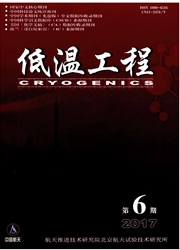

 中文摘要:
中文摘要:
基于线性热声理论设计并搭建了一台丝网型驻波热声发动机,采用不同目数的不锈钢丝网进行试验,考察了丝网板叠几何参数和工作压力对热声发动机工作特性的影响,实验结果和线性热声理论计算结果吻合度较好。实验发现,高目数丝网板叠更容易使系统起振,在实验范围内热声发动机采用不同板叠时的最小起振温度均发生在小充气压力下;在不同的充气压力下,存在最优目数的丝网使得发动机性能最佳。对该台热声发动机而言,最佳的丝网水利半径应为热渗透深度的4.5倍左右。
 英文摘要:
英文摘要:
A screen-stack type standing-wave thermoacoustic engine was designed and built based on linear thermoacoustic theory. The influence of different stack on the performance of thermoacoustic engine was tested and analyzed. Both experiment and simulation indicate that it is easier for engine with higher mesh screen stack to oscillate, and there exists a minimum onset temperature when mean pressure is low; besides, different mesh stacks should be chosen for different mean pressure. For the standing wave ther- moacoustic engine, the optimum stack hydraulic radius should be about 4.5 times of thermal penetration depth.
 同期刊论文项目
同期刊论文项目
 同项目期刊论文
同项目期刊论文
 期刊信息
期刊信息
